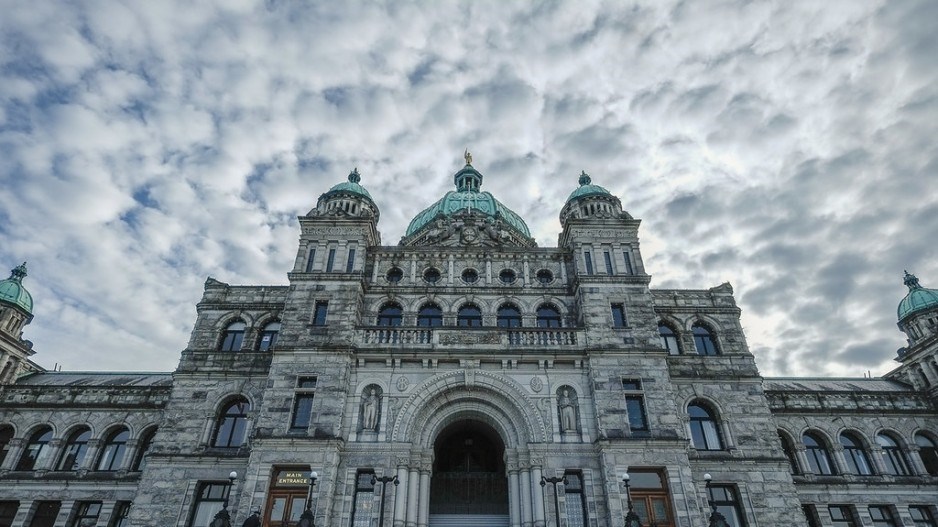In response to U.S. tariffs, members of the BC NDP caucus, led by B.C. Premier David Eby, have been “elbows up,” imploring British Columbians to take a “Team Canada” approach by supporting B.C. businesses and buying Canadian products.
But their stock portfolios, last disclosed in 2024, may indicate their commitment to “Team Canada” doesn’t extend to assets and investments.
Of the 30 re-elected NDP MLAs who have 2024 disclosures available through B.C.’s Conflict of Interest Commissioner, only five have disclosures that clearly indicate that U.S. equities are not part of their disclosed assets. All of the other members have disclosed a mix of portfolios that include U.S. equities, and of those, a number hold strictly U.S. equity portfolios, if not individual U.S. stocks via trading accounts.
In March, Eby barred U.S. liquor from entering the province through its government-controlled distribution warehouses, and this month he ordered government ministries, health authorities and core Crown corporations to review all contracts with U.S. companies, to “decrease the province’s dependence on goods and services from U.S. suppliers.”
Those measures will arguably cost B.C. consumers directly or indirectly.
Chairing the government’s tariff response committee since January 29 has been Minister of Housing and Municipal Affairs Ravi Kahlon, MLA for Delta North.
BIV asked Kahlon what his logic was behind his caucus’ suggestion to buy B.C. or Canadian products.
By way of example, he spoke to cucumbers.
“Cucumbers are just being produced right now in our greenhouses. They’re going to be coming on the market. You buy a local cucumber, you’re supporting a local company. So I think there’s a real benefit in that,” said Kahlon.
BIV asked Kahlon if that same principle should apply to investing in Canadian companies as opposed to American ones.
“I don’t give anyone advice on what investments they want to make,” said Kahlon. “But what I would say is, you know, we encourage people to invest their dollars locally.”
Kahlon discloses an unspecific “Clarington investment ethical fund” and told BIV it’s managed through Vancity.
The fund is a mix of equities and fixed income. Should Kahlon’s fund include global equities, it’s understood they would be derived from the IA Clarington Inhance Global Equity SRI (Social Responsibility Investing) Class, which holds 68 per cent U.S. equities, with Microsoft, Visa, Amazon and Apple being among the more notable top holdings.
Meanwhile, high-profile cabinet ministers Bowinn Ma, Josie Osborne, Adrian Dix and Jennifer Whiteside all own U.S. equity portfolios or portfolios heavily invested in U.S. companies.
Eby’s assets are unclear to the public. He lists a “hold mail account” whereby trading is administered by an investment advisor. According to the disclosure, the contents of the portfolio are “not disclosed to member.”
Eby did not respond to a request for comment on the topic.
In March, Eby pulled Tesla charger rebates, ostensibly on principled grounds.
“Yeah, it’s just for Tesla, and it’s because of Elon Musk,” Eby said at the time.
Eby’s Minister of Mining and Critical Minerals Jagrup Brar, Minister of State for Trade Rick Glumac and Minister of Finance Brenda Bailey all disclosed holding Tesla shares in 2024. Nelson-Creston MLA Brittny Anderson list owning shares of Ark Innovation ETF, 11 per cent of which is Tesla shares.
Bailey also declined an opportunity to comment but a spokesperson told BIV via email that she had sold her Tesla shares. The Minister's stocks were sold, and the change reported to the commissioner, in January 2025, the spokesperson told BIV April 23.
BIV reached out to the other members to confirm whether they continue to own shares in Tesla. A representative for Glumac said he no longer holds shares in the company; no other responses were received by press time. BIV also asked Kahlon about investing in Tesla.
“I would say that everyone should look at where their investments are going, and in particular, Tesla,” Kahlon said. “If you’re investing in Tesla with what’s happening there, you should be thinking twice about it.”
University of British Columbia political scientist Stewart Prest said silence from politicians on their investment portfolios aligns with a general pattern.
“We are much more comfortable talking about income and expenditures than wealth and investments,” he said.
Prest said there is no suggestion of a conflict of interest, but that it is useful to ask where people are putting their money, particularly if they are urging others to make potentially costly decisions in support of a cause. He added that there seems to be “a lack of personal commitment to match the political message” when it comes to caucus leaders’ investments.
Despite having opened a new legislature session in February, MLA disclosures for 2025 have yet to be collected and processed by the commissioner’s office.
The office told BIV it expects to send those disclosures to the clerk’s office in May.
When asked about the fact that laws are being made by new MLAs without new disclosures, Prest said that as long as the commissioner is meeting legislated deadlines, the only problem may be optics.
This article was update to reflect the date Minister Bailey reported a sale of stocks



